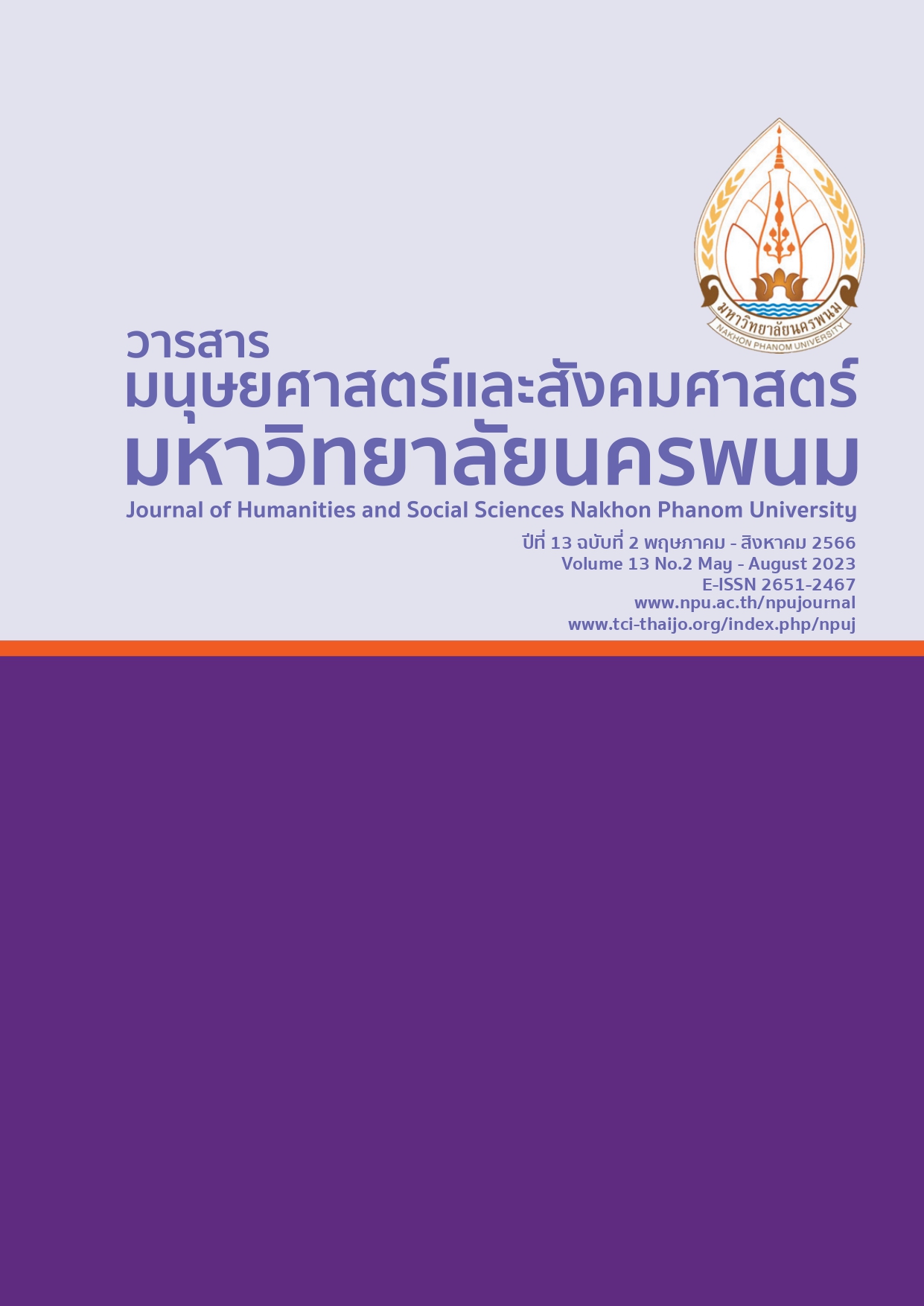การพัฒนาชุดกิจกรรมการเรียนรู้ด้วยตนเอง เรื่อง แนวคิดเชิงคำนวณ ตามแนวทาง SEASES Model เพื่อส่งเสริมทักษะการแก้ปัญหา สำหรับนักเรียนชั้นมัธยมศึกษาปีที่ 2
Main Article Content
บทคัดย่อ
การวิจัยครั้งนี้มีวัตถุประสงค์เพื่อพัฒนาและหาประสิทธิภาพของชุดกิจกรรมการเรียนรู้ด้วยตนเอง เรื่อง แนวคิดเชิงคำนวณ ตามแนวทาง SEASES Model เพื่อส่งเสริมทักษะการแก้ปัญหา สำหรับนักเรียน ชั้นมัธยมศึกษาปีที่ 2 ให้มีประสิทธิภาพตามเกณฑ์ 80/80 เพื่อศึกษาผลการใช้ชุดกิจกรรมการเรียนรู้ด้วยตนเอง และเพื่อศึกษาความพึงพอใจของนักเรียนที่มีต่อชุดกิจกรรมการเรียนรู้ด้วยตนเอง กลุ่มตัวอย่างที่ใช้ ได้แก่ นักเรียนชั้นมัธยมศึกษาปีที่ 2/4 โรงเรียนเทศบาล 5 เด่นห้า จังหวัดเชียงราย ภาคเรียนที่ 1 ปีการศึกษา 2564 จำนวน 40 คน โดยวิธีการสุ่มแบบกลุ่ม เครื่องมือที่ใช้ ได้แก่ แผนการจัดการเรียนรู้ มีความเหมาะสมอยู่ในระดับมากที่สุด (=4.93) ชุดกิจกรรมการเรียนรู้ด้วยตนเอง มีความเหมาะสมอยู่ในระดับมากที่สุด (=4.96) แบบวัดผลสัมฤทธิ์ทางการเรียน ค่าความเชื่อมั่นเท่ากับ 0.92 แบบวัดทักษะการแก้ปัญหาค่าความเชื่อมั่นเท่ากับ 0.95 แบบสอบถามความพึงพอใจของนักเรียน ค่าความเชื่อมั่นเท่ากับ 0.92 วิเคราะห์ข้อมูลด้วยสถิติค่าเฉลี่ย ค่าเบี่ยงเบนมาตรฐาน ค่าร้อยละ และสถิติทดสอบค่าที ผลการวิจัยพบว่า ชุดกิจกรรมการเรียนรู้ด้วยตนเองมีค่าประสิทธิภาพ 84.21/85.06 สูงกว่าเกณฑ์ที่กำหนดไว้ 80/80 ผลสัมฤทธิ์ทางการเรียนและทักษะการแก้ปัญหาหลังเรียน สูงกว่าเกณฑ์ร้อยละ 70 ที่กำหนด อย่างมีนัยสำคัญทางสถิติที่ระดับ .01 โดยมีผลสัมฤทธิ์ทางการเรียน ร้อยละ 82.81 และทักษะการแก้ปัญหา ร้อยละ 85.06 และความพึงพอใจต่อชุดกิจกรรมการเรียนรู้ด้วยตนเองในภาพรวม อยู่ในระดับมากที่สุด(=4.51, S.D.=0.53) ส่งผลให้ได้ชุดกิจกรรมที่มีประสิทธิภาพ ในการจัดการเรียนการสอนเพื่อพัฒนาทักษะการแก้ปัญหาของนักเรียนให้มีสมรรถนะในศตวรรษที่ 21
Article Details

อนุญาตภายใต้เงื่อนไข Creative Commons Attribution-NonCommercial-NoDerivatives 4.0 International License.
เอกสารอ้างอิง
Barrow, H. S. (2000). Problem-based learning applied to Medical Education. Revised edition. Illinois : School of Medicine, Southern Illinois University.
Buosonte, R. (2020). Kānwičhai læ phatthanā nawattakam kānsưksā [Research and development of educational innovation]. (5th ed). Bangkok : Chulalongkorn University.
Chantorn, S. and colleagues. (2019). Kānphatthanā chut kitčhakam kānrīanrū khō̜mphiutœ̄ tām nǣokhit thritsadī khō̜n satraktiwit phư̄a sœ̄msāng thaksa khwāmkhit sāngsan khō̜ng nakrīan chan matthayommasưksā pī thī nưng [The Development of Computer Learning Activities Based on the Concept of Constructivist Theory to Enhance the Creativity of Mathayomsuksa 1 students]. Journal of Ratchathani Innovative Social Sciences. 3(2),19-30.
Eisenkraft, A. (2003). Expanding the 5E model: A proposed 7E model emphasizes “transfer of learning” and the importance of eliciting prior understanding. The Science Teacher. Washington : The National Science Teachers Association
Krulik, S. and Rudnick, J. A. (1993). Reasoning and Problem Solving: A Handbook for Elementary School Teachers. Massachusetts : Allyn and Bacon.
Khaemanee, T. (2017). Sāt kānsō̜n : ʻongkhwāmrū phư̄a kānčhat krabūankān rīanrū thī mī prasitthiphāp (Phim khrang thī pǣt) [Didactics: Explicit Knowledge for Effective Learning Process Management]. (8th ed). Bangkok : Chulalongkorn University.
Miller, D. (1998). Enhancing Adolescent Competence : Strategies for Classroom Management. Washington : An International Thomson Publishing Company.
Ministry of Education. (2009). Laksūt kǣn klāng kānsưksā naphư̄n thān Phutthasakkarāt sō̜ngphan hārō̜ihāsipʻet [Basic Education Curriculum 2008]. Bangkok : Agricultural Cooperative Federation of Thailand., Limited.
Mekwan, W. (2018). Kānphatthanā chut kitčhakam khō̜mphiutœ̄ dōi chai kānrīanrū bǣp khrōng ngān rūam kap hā STEPs læ Coaching thī song phon tō̜ khwāmkhit sāngsan thaksa khrōng ngān khō̜mphiutœ̄ læ phon samrit thāngkān rīan samrap nakrīan chan matthayommasưksā pī thī sō̜ng. [Development of Computer Activity Packages by Using Project Base Learning, Five Steps and Coaching Affecting Mattayom Suksa 2 Students]. Journal of Education, Faculty of Education, Kamphaeng Phet Rajabhat University. 3(6),76-92.
Office of the National Economic and Social Development Board. (2011). Phǣn phatthanā sētthakit læ sangkhom hǣng chāt chabap thī sip ʻet Phō̜.Sō̜. sō̜ngphanhārō̜ihāsiphā - sō̜ngphanhārō̜ihāsipkāo [National Economic and Social Development Plan]. Bangkok : Sahamit Printing and Publishing.
Phosri, R. (2007). Kānsāng chut kitčhakam kānčhatkān rīanrū [Construction of Learning Management Activity Packages]. Uttaradit : Uttaradit Rajabhat University.
Panich, W. (2011). Nǣothāng kānbō̜rihān čhatkān rīanrū sū prachākhom ʻĀsīan [Guidelines for Learning Management towards the ASEAN Community]. Bangkok : Agricultural Cooperative Federation of Thailand., Limited.
Phuvorawan, Y. (2019). Thammai tō̜ng hai dek læ yaowachon rīan kān khīan prōkrǣm [Why do children and youth learn about computer coding?]. Retrieved January 2022, from https://www.facebook .com/permalinkphp?storyfbid=10207313235846793&id=1162233576.
Siriwetburi, J., Suptanatphakchana, S. and Thongsorn, P. (2019). Kānphatthanā chut kitčhakam kān rīan dōI prayuk chai krabūankān rīanrū panhā pen thān phư̄a phatthanā thaksa kān kǣ panhā klum sāra kānrīanrū sangkhommasưksā sātsanā læ watthanatham chan prathomsưksā pī thī hā [The Development of Learning Activity Package Applying the Problem-based Learning Process to Develop Problem-solving Skill for Grade 5 Primary School Students, Social studies, Religion and Culture Department]. Journal of Graduate School Sakon Nakhon Rajabhat University. 16(72),136-146.
Tuntavanitch, P. and Jindasri, P. (2018). Khwammai thithæ ching khong kha IOC [The Real Meaning of IOC]. Journal of Educational Measurement Mahasarakham University. 24(2),3-12.
Weerasin, W. and Akkatimakul, S. (2019). Kānphatthanā chut kitčhakam kānrīanrū dōi chai krabūankān kǣ panhā pen thān samrap kānsưksā khlư̄n mǣlekfaifā. [Development of an Instructional Activity Package Based on the Problem-solving Process for Electromagnetic Wave Education]. Journal of Narathiwat Rajanagarindra University. 6(2),48–59.
Weir, J. J. (1974). Problem Solving is Everybody’s Problem. The Science Teacher. Arlington, Virginia, U.S. : National Science Teachers Association (NSTA).
Wing, J. M. (2021). Computational Thinking. Retrieved December 2021, from https://www.cs.cmu.edu/ ~15110s13/Wing06-ct.pdf.
Wongyos, S. (2020). kānphatthanā rūpbǣp kānčhatkān rīanrū dōi chai panhā pen thān rūam kap sư̄ sangkhom ʻō̜nlai rư̄ang kān rūthao than sư̄ dičhithan phư̄a songsœ̄m thaksa dān sārasonthēt sư̄ læ theknōlōyī samrap nakrīan chan matthayommasưksā pī thī sām. [Development of Learning Management Model Using Problem-based Learning with the Aid of Social Media and Digital Literacy to Enhance Information,Media and Technology Skills of Mathayomsuksa Three Students]. Chiang Rai : Chiang Rai Municipality School 5 Denha.
Zimmerman, B. J. and Lebeau, R. B. (2000). A Commentary on Self-Directed Learning. New Jersey : Lawrence.


